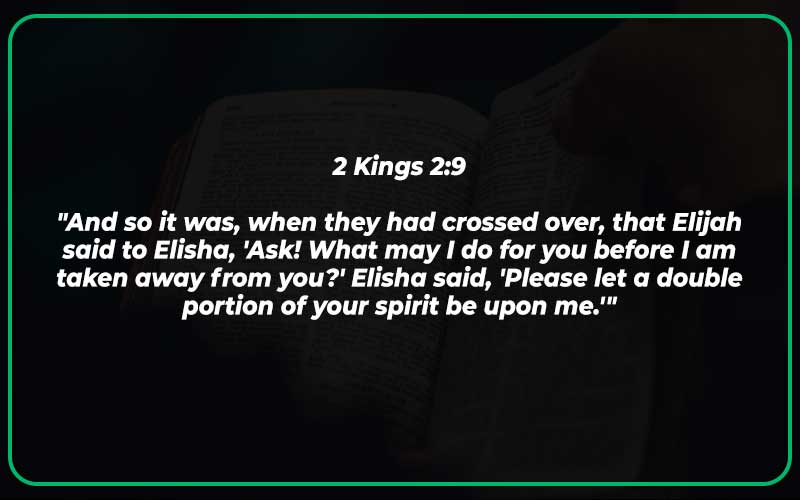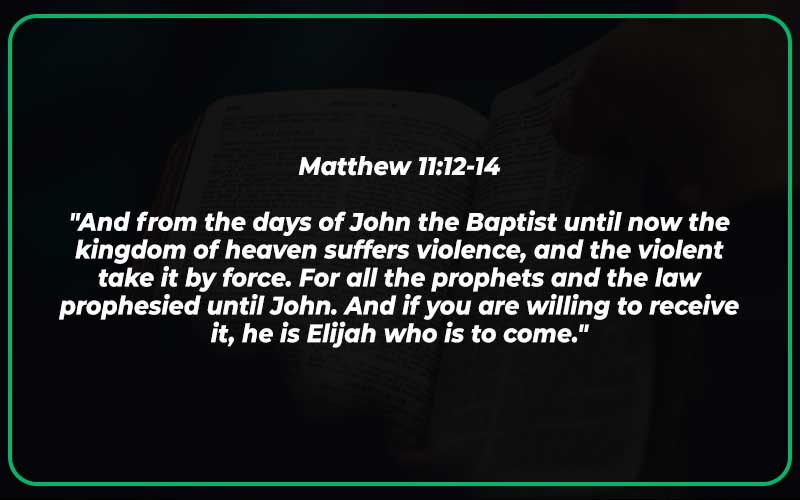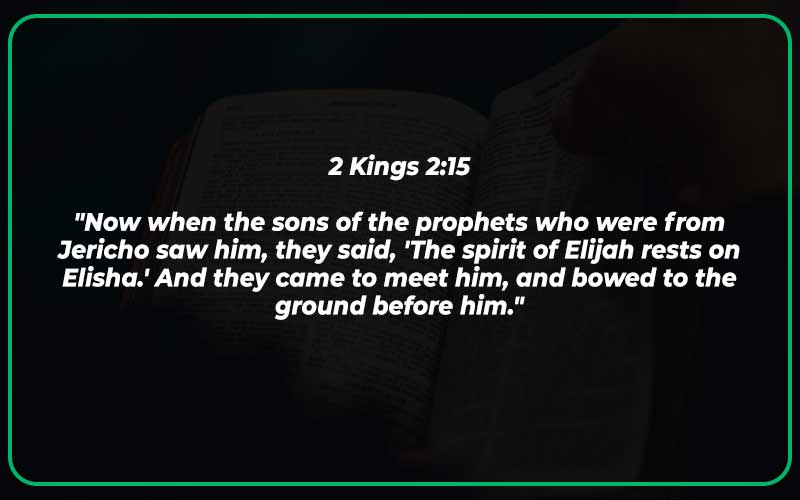The spirit of Elijah, known for his boldness, courage, and prophetic ministry, is a powerful example for believers today. The Bible mentions the spirit of Elijah in verses that inspire us to stand up for truth, walk in righteousness, and prepare the way for the Lord’s coming.
Join me as we delve into these verses, exploring the lessons and applications of the spirit of Elijah in our own lives, and embracing the call to be bold witnesses for God’s kingdom.
Bible Verses about the Spirit and Power of Elijah
Malachi 4:5-6
“Behold, I will send you Elijah the prophet before the coming of the great and dreadful day of the LORD. And he will turn the hearts of the fathers to the children, and the hearts of the children to their fathers.”
In these verses, God promises to send Elijah before the coming of the Lord. Elijah’s mission would be to restore relationships within families and reconcile generations, emphasizing the importance of unity and love.
Luke 1:17
“He will also go before Him in the spirit and power of Elijah, to turn the hearts of the fathers to the children, and the disobedient to the wisdom of the just, to make ready a people prepared for the Lord.”
This verse speaks of John the Baptist, who came in the spirit and power of Elijah. John’s ministry echoed Elijah’s purpose, preparing the way for Jesus by calling people to repentance and preparing their hearts for the Lord’s coming.
Matthew 11:14
“And if you are willing to receive it, he is Elijah who is to come.”
Jesus affirms that John the Baptist fulfilled the prophecy of Elijah’s return. He identifies John as the one who came in the spirit of Elijah, preparing the people for the Messiah’s arrival.
Mark 9:13
“But I say to you that Elijah has also come, and they did to him whatever they wished, as it is written of him.”
Jesus refers to John the Baptist as the fulfillment of the prophecy regarding Elijah’s return. Despite mistreatment and rejection, John faithfully carried out his mission.
James 5:17
“Elijah was a man with a nature like ours, and he prayed earnestly that it would not rain; and it did not rain on the land for three years and six months.”
This verse highlights the power of Elijah’s prayer. Through his faith and dependence on God, he brought about a prolonged drought in the land, demonstrating the extraordinary power bestowed upon him.
1 Kings 18:21
“And Elijah came to all the people, and said, ‘How long will you falter between two opinions? If the LORD is God, follow Him; but if Baal, follow him.’ But the people answered him not a word.”
Elijah boldly challenged the people of Israel to choose between serving God or following false idols. His words called for a decision and urged them to wholeheartedly commit to the Lord.
2 Kings 2:9
“And so it was, when they had crossed over, that Elijah said to Elisha, ‘Ask! What may I do for you before I am taken away from you?’ Elisha said, ‘Please let a double portion of your spirit be upon me.'”
Elisha, Elijah’s faithful disciple, desired to inherit Elijah’s anointing and power. He asked for a double portion of Elijah’s spirit, seeking to continue the work of his mentor and carry forth the prophetic ministry.

2 Kings 2:11
“Then it happened, as they continued on and talked, that suddenly a chariot of fire appeared with horses of fire, and separated the two of them; and Elijah went up by a whirlwind into heaven.”
Elijah’s departure from Earth was a remarkable event. God sent a chariot of fire and a whirlwind to transport Elijah into heaven, signifying his unique relationship with God and the extraordinary nature of his ministry.
Malachi 3:1
“Behold, I send My messenger, and he will prepare the way before Me. And the Lord, whom you seek, will suddenly come to His temple, even the Messenger of the covenant, in whom you delight.”
This verse alludes to John the Baptist’s role as the messenger preparing the way for the Lord. His ministry paved the path for Jesus’ arrival and the establishment of the new covenant.
Matthew 17:11-13
“Jesus answered and said to them, ‘Indeed, Elijah is coming first and will restore all things. But I say to you that Elijah has come already, and they did not know him but did to him whatever they wished. Likewise, the Son of Man is also about to suffer at their hands.’ Then the disciples understood that He spoke to them of John the Baptist.”
Jesus confirms the connection between John the Baptist and the prophecy of Elijah’s return. He emphasizes the fulfillment of Elijah’s role in John’s ministry and the significance of both in God’s plan of redemption.
Luke 4:25-26
“But I tell you truly, many widows were in Israel in the days of Elijah when the heaven was shut up three years and six months, and there was a great famine throughout all the land; but to none of them was Elijah sent except to Zarephath, in the region of Sidon, to a woman who was a widow.”
Jesus references the time of Elijah’s ministry when there was a severe drought and famine. Despite many widows in Israel, God sent Elijah to provide for a widow in Sidon, illustrating God’s care and His sovereignty in directing Elijah’s actions.
Luke 9:54-55
“And when His disciples James and John saw this, they said, ‘Lord, do You want us to command fire to come down from heaven and consume them, just as Elijah did?’ But He turned and rebuked them, and said, ‘You do not know what manner of spirit you are of.'”
In this incident, James and John wanted to imitate Elijah’s actions by calling down fire from heaven. However, Jesus corrected their mindset, teaching them about the spirit of love, grace, and mercy that characterized His ministry.
Luke 9:30-31
“And behold, two men talked with Him, who were Moses and Elijah, who appeared in glory and spoke of His decease which He was about to accomplish at Jerusalem.”
During the transfiguration, Moses and Elijah appeared and conversed with Jesus. Their presence highlighted their significance as representatives of the law and the prophets, affirming Jesus’ fulfillment of Old Testament prophecies.
Matthew 3:4
“Now John himself was clothed in camel’s hair, with a leather belt around his waist; and his food was locusts and wild honey.”
John the Baptist’s unique appearance and simple lifestyle reflected the spirit of Elijah. He lived in the wilderness, similar to Elijah, and his commitment to God’s calling made him a powerful witness.
Matthew 17:2-3
“And He was transfigured before them. His face shone like the sun, and His clothes became as white as the light. And behold, Moses and Elijah appeared to them, talking with Him.”
In this extraordinary moment, Moses and Elijah appeared with Jesus during His transfiguration. Their presence affirmed Jesus’ authority and connected Him to the prophetic legacy represented by Moses and Elijah.
Matthew 17:10-13
“And His disciples asked Him, saying, ‘Why then do the scribes say that Elijah must come first?’ Jesus answered and said to them, ‘Indeed, Elijah is coming first and will restore all things. But I say to you that Elijah has come already, and they did not know him but did to him whatever they wished. Likewise, the Son of Man is also about to suffer at their hands.’ Then the disciples understood that He spoke to them of John the Baptist.”
The disciples questioned Jesus about the prophecy of Elijah’s coming. Jesus explained that Elijah had already come in the person of John the Baptist, fulfilling the role of a forerunner before His own suffering and crucifixion.
Also Read: 27 Bible Verses about Angels (With Commentary)
Matthew 11:12-14
“And from the days of John the Baptist until now the kingdom of heaven suffers violence, and the violent take it by force. For all the prophets and the law prophesied until John. And if you are willing to receive it, he is Elijah who is to come.”
Jesus highlights the importance of John the Baptist’s ministry as the culmination of prophetic promises. He describes the kingdom of heaven being forcefully advanced since John’s time and affirms that John is the Elijah who was to come.

Mark 1:6
“Now John was clothed with camel’s hair and with a leather belt around his waist, and he ate locusts and wild honey.”
John the Baptist’s appearance and dietary choices aligned with the spirit of Elijah, mirroring his lifestyle and emphasizing his unique role in preparing the way for Jesus.
Mark 8:28
“So they answered, ‘John the Baptist; but some say, Elijah; and others, one of the prophets.'”
When Jesus asked His disciples about people’s perception of His identity, they mentioned that some considered Him to be Elijah or one of the prophets. This reveals the association between Elijah and Jesus’ ministry in the eyes of the people.
Luke 9:8
“And some said, ‘Elijah has appeared,’ and others said, ‘One of the old prophets has risen again.'”
Similar to the response of the disciples, people speculated that Jesus might be Elijah or one of the old prophets resurrected. This demonstrates the recognition of Jesus’ ministry as having a connection to the prophetic legacy, particularly that of Elijah.
Luke 9:19
“So they answered and said, ‘John the Baptist, but some say Elijah; and others say that one of the old prophets has risen again.'”
When Jesus asked His disciples about people’s opinion of His identity, they mentioned John the Baptist, Elijah, and other resurrected prophets as the possibilities. This further underscores the association between Elijah and the perception of Jesus’ ministry.
Luke 9:54
“And when His disciples James and John saw this, they said, ‘Lord, do You want us to command fire to come down from heaven and consume them, just as Elijah did?'”
In this instance, James and John referred to Elijah’s action of calling down fire from heaven as a response to those who rejected Jesus. However, Jesus corrected their approach, revealing a different spirit and purpose in His ministry.
James 5:17-18
“Elijah was a man with a nature like ours, and he prayed earnestly that it would not rain; and it did not rain on the land for three years and six months. And he prayed again, and the heaven gave rain, and the earth produced its fruit.”
This verse acknowledges Elijah’s humanity and the power of his prayers. His fervent intercession caused a prolonged drought and later brought forth rain, demonstrating the effectiveness of a righteous person’s prayers.
2 Kings 1:10
“So Elijah answered and said to the captain of fifty, ‘If I am a man of God, then let fire come down from heaven and consume you and your fifty men.’ And fire came down from heaven and consumed him and his fifty.”
In this account, Elijah called down fire from heaven to consume a captain and his fifty soldiers who were sent to capture him. This event showcased the power and authority given to Elijah by God, revealing his role as a messenger and prophet.
2 Kings 2:15
“Now when the sons of the prophets who were from Jericho saw him, they said, ‘The spirit of Elijah rests on Elisha.’ And they came to meet him, and bowed to the ground before him.”
After Elijah was taken up to heaven, Elisha succeeded him. The sons of the prophets recognized the spirit of Elijah resting upon Elisha, acknowledging his anointing and authority as the successor to the great prophet.

What does the Bible say About the Spirit and Power of Elijah?
In the Bible, the Spirit and Power of Elijah are significant concepts associated with the prophet Elijah. Elijah was a prominent figure in the Old Testament, known for his fiery zeal for God and his role as a prophet and miracle-worker. The term “Spirit of Elijah” is not explicitly defined in one specific verse but is inferred from various passages throughout the Bible.
- Elijah’s Prophetic Ministry: Elijah’s prophetic ministry was marked by boldness and faithfulness to God. He fearlessly confronted idolatry and challenged the wicked rulers of his time. His mission was to call the people of Israel back to the worship of the one true God, Yahweh.
- The Spirit of Elijah on Elisha: In 2 Kings 2:9-15, after Elijah’s departure from Earth in a whirlwind, his disciple Elisha received a double portion of his spirit. This indicates that the “Spirit of Elijah” represents the prophetic anointing and power that Elijah possessed, which was passed on to Elisha.
- John the Baptist as the Fulfillment: In the New Testament, the angel Gabriel prophesied that John the Baptist would come “in the spirit and power of Elijah” (Luke 1:17). John, who prepared the way for Jesus Christ, reflected Elijah’s boldness and uncompromising message of repentance.
- The Transfiguration: During the Transfiguration (Matthew 17:1-13), when Jesus was transformed before Peter, James, and John, Elijah appeared alongside Moses. This event symbolized the continuity between the Law (represented by Moses) and the Prophets (represented by Elijah) with the ministry of Jesus as the fulfillment of both.
- Future Return: Malachi 4:5-6 predicts that before the coming of the great and dreadful day of the Lord, God will send Elijah the prophet to turn the hearts of fathers to their children and vice versa. Many interpret this as a metaphorical reference to the spirit of Elijah returning in the end times.
Overall, the “Spirit and Power of Elijah” represents a spirit of radical obedience, faith, and courage in serving God. It emphasizes the continuity of God’s plan throughout history, preparing the way for the ultimate fulfillment in the person of Jesus Christ and pointing to future events leading up to the end times.

